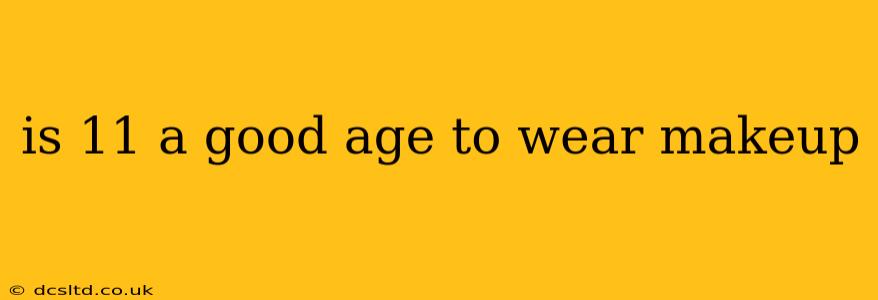Is 11 a Good Age to Wear Makeup? A Parent's Guide
The question of when a child should start wearing makeup is a common source of debate among parents. There's no single right answer, as it depends heavily on individual maturity levels, cultural norms, and family values. However, let's explore the factors to consider when deciding if 11 is an appropriate age for makeup use.
What are the arguments for allowing 11-year-olds to wear makeup?
Some parents believe that allowing their 11-year-old to wear makeup can boost their self-esteem and confidence. If a child feels self-conscious about their appearance, a little makeup might help them feel better about themselves. Additionally, allowing experimentation with makeup can be seen as a way to foster self-expression and creativity. It can also be a way to bond with a parent or older sibling, as they might teach the child how to apply makeup appropriately.
What are the arguments against allowing 11-year-olds to wear makeup?
Conversely, many argue that 11 is too young to start wearing makeup regularly. Concerns often center around the potential negative impacts on a child's self-image and development. Excessive makeup use at a young age could lead to a preoccupation with appearance, potentially affecting their self-esteem negatively if they feel pressure to constantly look a certain way. Furthermore, certain makeup products may contain harsh chemicals that could irritate sensitive skin, particularly at a younger age. Finally, some parents feel that allowing makeup at 11 sets a precedent for earlier engagement with the often-pressure-filled world of beauty standards.
What about the social pressures?
This is a crucial factor. Many 11-year-olds are already experiencing social pressures related to appearance, even without makeup. If friends are wearing makeup, an 11-year-old might feel pressured to conform. Parents need to carefully assess the social environment their child is in and consider whether allowing makeup would increase or reduce pressure. Open communication is essential; understanding the reasons behind the child's desire to wear makeup helps parents navigate the situation appropriately.
What is the role of parental guidance and education?
Regardless of whether you decide to allow your 11-year-old to wear makeup, parental guidance is critical. If you do allow it, emphasize the importance of using age-appropriate products, focusing on skincare, and teaching proper application techniques. This helps minimize potential risks associated with harsh chemicals and encourages healthy skin habits. It also provides an opportunity to discuss the pressures of social media and the importance of self-acceptance and self-love. If you choose not to allow makeup, it’s important to explain your reasoning clearly and empathetically, helping your child understand and accept your decision.
What types of makeup are appropriate for 11-year-olds?
If makeup is permitted, start with minimal, natural-looking options. A tinted lip balm, a little mascara, or a sheer blush are generally considered acceptable starting points. Avoid heavy foundation or eye shadow, which are generally unnecessary and can be detrimental to a child's delicate skin.
How can I have a productive conversation with my 11-year-old about makeup?
Open, honest communication is key. Discuss your concerns, listen to their perspective, and together establish guidelines for makeup use. This might include limiting the amount of makeup allowed, specifying when and where it can be worn, or establishing specific products that are permitted. The goal is to find a balance that supports your child's self-esteem while also protecting their health and well-being.
Ultimately, the decision of whether or not an 11-year-old should wear makeup is personal and should be made on a case-by-case basis. Consider your child's maturity level, social environment, and your family values. Open communication, education, and a focus on healthy self-image are crucial elements in navigating this phase of development.
